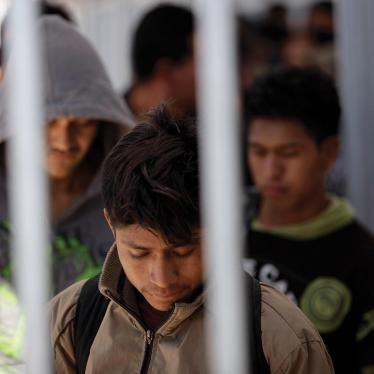“Sonia” is not the type of person you’d expect to find in jail. In the 20 years since she made the journey from Mexico to Los Angeles, where she worked long hours in a dry cleaners and raised a family, she was careful even to avoid driving without a license. But when I met her last September at the Presidio County Jail in Marfa, Sonia tearfully explained that she had a federal criminal record and was facing deportation.
Sonia’s crimes? Entering and re-entering the United States illegally.
Although her two younger children are American citizens and her long-term partner is a legal permanent resident, Sonia, 50, was in the U.S. without legal papers. So when she tried to return after a brief trip to Mexico for the funeral of her eldest son, she was arrested at the border and convicted of illegal entry, a federal crime. After serving a 45-day prison sentence, she was deported.
Desperate to rejoin her 11-year-old daughter and the rest of her family, Sonia tried to return; again she was caught. After spending three-and-a-half months in jail, where I met her, awaiting the conclusion of her case, she was convicted of the felony offense of illegal re-entry and deported once more. Under existing immigration law, Sonia is permanently barred from returning to the country she and her remaining children consider home.
Stories like Sonia’s are increasingly common. In recent years, illegal entry and re-entry have become the most prosecuted federal crimes in the country, overtaking drug, firearm, and white-collar offenses. In the past, criminal prosecution was generally reserved for people with serious prior convictions, while most other unauthorized migrants were returned or deported under civil immigration law. But as a new Human Rights Watch report shows, there has been a significant shift in recent years toward the criminal prosecution of people like Sonia – people with minor criminal records or none at all.
As in Sonia’s case, the stepped-up prosecutions often carry a heavy human cost. Many people prosecuted for nonviolent immigration offenses, punishable by up to six months for illegal entry and up to 20 years for illegal re-entry, are being separated from their U.S. families. And because their desire to return to the U.S. is so strong, they often become “repeat offenders.” Some 80,000 people were prosecuted for illegal entry or re-entry in 2012. The breadth and scope of these prosecutions have led to procedural shortcuts, including rapid-fire group trials in which more than 100 defendants may be processed at a time. The vast majority plead guilty after as little as five minutes with a lawyer, serve a prison sentence and are deported.
Not surprisingly, there are also substantial financial costs to criminally prosecuting and imprisoning people before they're deported. A 2012 report by an advocacy group estimated that the annual cost of incarcerating people for illegal entry and re-entry offenses reached $1 billion in 2011, which would not include the costs for courts, defense attorneys, prosecutors, and other necessary staff.
Yet, despite all the evidence of the high costs of these prosecutions, both human and financial, Congress seems intent on calling for more of the same. The immigration bill recently proposed by the Senate “Gang of Eight” calls for increased prosecutions in Tucson and increases the maximum penalties for many categories of defendants, all in the name of increased border security.
The bill in its current form, which just passed out of the Senate Judiciary Committee, includes provisions that could help people like Sonia, who have American families and whose only convictions are immigration-related, by providing a path to return to the U.S. legally. But it’s far from clear whether the provision can survive the legislative process intact, given the hostility of many lawmakers to any form of leniency. And the bill categorically excludes most people deported for criminal convictions – no matter how old or minor the offense – in the name of border security.
If the U.S. government is genuinely serious about border security, it should reform a barbed-wire policy that splits families to allow people who have been deported to return to their families legally and end these prosecutions for minor immigration offenses, so that law enforcement can focus more appropriately on those who are actually a threat to public safety or national security.
Otherwise, the U.S. is doomed to spend scarce resources prosecuting and imprisoning people like Sonia, who cannot imagine life without her family, and who told me, “For my daughter's sake, I will come back.”
Meng is a U.S. researcher at Human Rights Watch and author of a new report, “Turning Migrants into Criminals: The Harmful Impact of US Border Prosecutions.”







